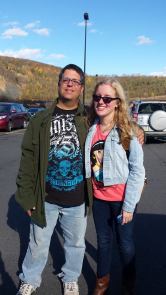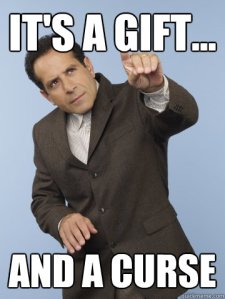Some of this will probably sound arrogant, braggy; it’s not meant to be. Some of this will sound exaggerated; it isn’t.
As I was growing up, my parents liked to joke that I was a thirty-year-old trapped in a child’s body. They weren’t wrong.
I was the kid who wanted to do nothing more than read. Greatschools.org lists some of the “best books for second-graders,” from Nim’s Island to Frog and Toad. I remember walking into my second-grade classroom with Harry Potter and the Order of the Phoenix, much to my teacher’s surprise. By the time I reached high school, I’d fallen in love with the classics. Even now, I’m rather atypical: how many nineteen-year-olds enthuse about Tolstoy?
In turn, I skipped out on some of the stepping-stones. I wasn’t interested in riding a bike or learning to swim— now considered basic skills learned years ago. I didn’t read the books or watch the shows aimed at my age level— now I can’t contribute to enthusiastic “do you remember ______?” with many of my peers. I’m slowly catching up on some. For example, it was only about two years ago when I first read The Velveteen Rabbit. I still haven’t gotten around to learning to swim or to ride a bike. All in due time, I suppose.
I’ve loved and still love animals far more than most people. These were my closest friends growing up.
Why? Animals weren’t immature or confused by things I’d say. They were sweet and cuddly; this sentiment’s stuck with me over the years.
Aside from my pets, adults and older students became my favourite people to spend time with. Even now, I’m amazed by the contacts I’ve kept from my hometown: while my college friends go off to meet up with their high school companions, I’m meeting up with former teachers and friends who’ve long since left college for the real world. I think this is why I’m shocked when I hear people explain that they haven’t talked to their parents in weeks. I talk to my mom, my grandparents, or my dad several times a day: I’ve always been closer to them psychologically than to those I went to school with.

Aren’t we cute?
My mom’s told me stories of comments I’d made from a very young age, words “wise beyond my years.” My dad spent years prompting me to go outside and run around, “enjoy life.” While other parents were coaxing their kids to come in and do their homework, mine worried I wasn’t enjoying my childhood.
I distinctly remember certain moments of this “maturity,” as others have termed it— I prefer the terms “empathy” or “sentiment, “in most cases. I remember not wanting to get out of bed after Mom had tucked me in— she’d taken the time and effort to cover me up, slide Zoboomafoo under the blankets, I couldn’t bear ruining it.
I remember my peers coloring on their notebooks and folders, scribbling mindlessly on their books. I remember being appalled that they could ruin what their parents or whoever had gotten for them.
I remember reading poetry, Shakespeare, and understanding it on an almost instinctual level. This “instinct” can be troublesome, especially in school. Take Latin, for example. As we translate a passage, we analyze the tense, form, etc. for each word before attempting a full translation. My problem in doing so is that I look at the words and, assuming I’m familiar with the vocabulary, I understand.
The same happens in my history courses, in most courses, really. I understand something too easily, then struggle to get my thoughts on the same level as my classmates, where the professor is teaching.
In turn for personal maturity and humanities-based talents, I’m relatively hopeless in STEM classes, so there’s a balance. I don’t claim any “special” status for understanding things, I don’t pretend to know everything.
At the same time, I recognize it as, as Adrian Monk would say….
I didn’t miss out on childhood, I’ve never had a lonely, miserable life. I’ve been perfectly happy amid big books and Murder, She Wrote. I didn’t spend high school swooning over boys and drinking in the woods, I studied and got involved, and enjoyed myself. Even so, I’m not perfect— I’m different. Society doesn’t like different, whatever claims of diversity they assert. I don’t feel the need to fit in, but the alternative becomes a roadblock.
Buzzfeed and its comrades like to write articles about “Introverts” and their wanting to stay inside and be anti-social. It’s a cause that’s recently been championed, recognizing that it’s okay to not always be the stereotypical extrovert. But no one fits these molds perfectly. Sure, I self-identify as an introvert most of the time. Yet my friends can testify that I won’t shut up when I don’t want to. I’m content with silence, but I still like to talk. I’m fine with performing in front of thousands, but I panic at the thought of a phone call. I love books and have anxiety that can sometimes be utterly crippling, but I also love to meet new people, travel the world and experience things that are just outside of my preconceived comfort zone, like dance classes quickly became (read more about that experience here!).
I see things logically, but with empathy. I feel other people’s emotions and adjust my own in response. I understand concepts, but can’t tell you why. I know the answer, the definition, but I can’t describe it adequately.
It’s a gift, and a curse.







And that’s what makes you – YOU. And to us – you’re perfect 🙂
And I’m never forget the time when, as a toddler, little pop was chasing you and you very clearly told him to stop aggravating you. Best mini adult moment ever.
LikeLiked by 2 people
Aw, thank you!
LikeLike
It sounds like you have a supportive and sweet family. I found your blog over at OM’s site. Sounds like you are doing a good job.
LikeLiked by 1 person
Thank you!
LikeLiked by 1 person
You’re welcome.
LikeLiked by 1 person
Wow, this was really interesting to read! I identified with much of what you said! I was never the “typical” child/student growing up. We have quite a bit in common.
LikeLiked by 1 person
It certainly seems that we do! 🙂
LikeLike